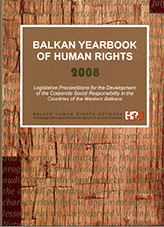Legislative Preconditions for the Development of Corporate Social Responsibility in Albania
Legislative Preconditions for the Development of Corporate Social Responsibility in Albania
Author(s): Eralda Cani, Elma TershanaSubject(s): Law, Constitution, Jurisprudence
Published by: Balkan Human Rights Network
Keywords: Corporate Social Responsibility; global compact; the Labour Code; the Constitution; worker's rights; property rights; land management; corruption; environment; child labour; case study; business and human rights; standard; domestic legislation
Summary/Abstract: The question of responsibility to respect human rights is becoming more and more a matter of concern to companies, investors and consumers just like governmental, intergovernmental and non-governmental organizations. The respect for human rights by companies is a legal duty rather than an act of voluntarism. In Albania, "Global Compact", has been introduced since 2003 as part of a UNDP program. Albanian companies have voluntarily agreed to adhere to the 10 GC principles. A National Research Institute has been established in Albania to make research on ethics & business in Albania. Different actors, including the UNDP, national civil society actors, as well as Albanian government have worked and adopted guidelines to introduce ethics in the business sector. Today, Ethics in Business and Social Corporate Responsibility (CSR) are introduced as a compulsory subject in the curricula of the public Economic School at the Tirana University. Another initiative in respect of "human rights and business" has been introduced in Albania by the "Danish Institute for Human Rights" and the "Balkans Human Rights Network" under the project "Human Rights and Business". This project was implemented in Albania by the "Albanian Centre for Human Rights". The Balkans Quick Check (BQC), as an instrument, output of this project, is the most professional tool that the Albanian companies and businesses could use, compared with other instruments piloted by other organs. The BQC, with detailed questions and remarks, gives a proper level of respect and guarantee of human rights in a work environment. However, the project did not continue due to time constraints. The Albanian legislation protects employees' rights. It is based on international law and reflects the latter by and large. Also, several international human rights instruments ratified by the country form a part of the domestic legislation. These instruments provide for rights such as: the right to form and join trade unions and free function of trade unions (introduced since 1992), prohibition of discrimination at work, prohibition of slavery or servitude and forced labour and the right to free choice of employment, protection of children from exploitation (including prohibition of harmful work and definition of the minimum age for employment), the right to just and favourable conditions at work (including equal pay, decent living wages and safe and healthy working conditions), and the right to rest, leisure and reasonable limitations of working hours. The Albanian legislation, by regulating employment relations, introduces the obligation to respect human rights and freedoms. Copyright is also protected by a specific law as well as property rights.
Journal: Yearbook of the Balkan Human Rights Network
- Issue Year: 2008
- Issue No: 01
- Page Range: 32-66
- Page Count: 35
- Language: English

